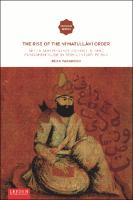The Rise of the Ni‘matullāhī Order
Shi'ite Sufi Masters against Islamic Fundamentalism in 19th-Century Persia
Abstract
"How were the Ni‘matullāhī masters successful in reviving Ni‘matullāhī Sufism in Shi‘ite Persia? This book investigates the revival of Ni‘matullāhī Sufi order after the death of the last Indian Ni‘matullāhī master, Riḍā ‘Alī Shāh (d. 1214/1799) in the Deccan.
After the fall of Safavids, the revival movement of the Ni‘matullāhī order began with the arrival in Persia of the enthusiastic Indian Sufi master, Ma‘ṣūm ‘Alī Shāh, during the last quarter of the eighteenth century. Later, at the beginning of the nineteenth century, Persian masters of the Ni‘matullāhī Order were able to solidify the order’s place in the mystical and theological milieu of Persia. Ma‘ṣūm ‘Alī Shāh and his disciples soon spread their mystical and ecstatic beliefs all over Persia. They succeeded in converting a large mass of Persians to Sufi teachings, despite the opposition and persecution they faced from Shi‘ite clerics, who were politically and socially the most influential class in Persia. The book demonstrates that Ḥusayn ‘Alī Shāh, Majdhūb ‘Alī Shāh, and Mast ‘Alī Shāh were able to consolidate the social and theological role of the Ni‘matullāhī order by reinterpreting and articulating classical Sufi teachings in the light of Persian Shi‘ite mystical theology.
"
Keywords
Sufism | Zand dynasty | Afshar Dynasty | Qajar Dynasty | Fath Ali Shah | Muhammad Khan Qajar | Lutf Ali Khan | Nadir Shah | Deccan | Persian | Persian Sufism | Sufi persecution | Persianate Sufism | Shi‘ite Sufism | Shi‘ism and Sufism | Mystical Shi‘ism | Usulism | Akhbarism | Wahdat Wujud (Unity of Being) | Majdhub Ali Shah | Husayn Ali Shah | Mast Ali ShahDOI
10.24415/9789087283674ISBN
9789087284, 9789400604131, 9789400604124Publisher
Leiden University PressPublisher website
https://www.lup.nl/Publication date and place
Leiden, 2021Series
Iranian Studies Series,Classification
Islamic groups: Sufis
Mysticism


 Download
Download Web Shop
Web Shop